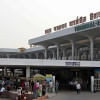A journey from protests to prison to pardon

In UAE's gleaming districts of skyscrapers and luxury hotels, the voices of Bangladeshi migrant workers are rarely heard. They toil away for home in the unfavourable conditions of the Gulf labour market thousands of miles away, while their rights are undermined and their legal and professional grievances go unnoticed.
Yet, on July 19, their voices were raised in streets across Abu Dhabi, Ajman, and other areas in Dubai. They marched peacefully in solidarity with the students' uprising. As international protests erupted around the world within the Bangladeshi diaspora, the migrant workers, often termed as remittance "warriors," had just wanted to exercise their fundamental rights as well, with no intention of inciting unrest in the UAE.
What followed, however, were swift arrests made by the UAE authorities. Taken into custody with immediate effect, they faced an iron-fisted legal system where dissent is met with zero tolerance. Human Rights Watch expressed concerns about the trial's pace, questioning if due process was followed. "Protests and demonstrations are fully prohibited under the country's penal code, which violates both the UAE's Constitution and international human rights standards, such as the Arab Charter on Human Rights to which the UAE is a party," which means, while the legal system followed the rules, the incident underscores the difficulties that foreign workers experience in such Kafkaesque circumstances.
The workers faced an uncertain future, caught in legal limbo, until Dr Yunus's key phone conversation, combined with extensive legal efforts, was followed by an unprecedented pardon.
Not to take away from the collective wave of joy and relief upon the news of all 57 of these individuals being granted clemency, but a lot of uncomfortable realisations have also arisen in tandem. It is difficult to forget the-then Awami League government's distasteful negligence and even inflammatory activities alongside UAE's overreach with the sentencing. When the workers were incarcerated, one may have dared to expect the Bangladeshi diplomatic corps to step in. After all, isn't the safety of Bangladeshi citizens abroad a top priority for these missions?
But let alone that, little to no diplomatic intervention was made by the former government to even ensure that the accused get a fighting chance to prove themselves innocent. For instance, B M Jamal Hossain, the Consul General to the UAE, had commented right after the arrests, that no sympathy was to be shown to the detained. The collective inaction of the foreign ministry and the Bangladesh Embassy in Abu Dhabi also had aggravated the situation, leaving the workers with no legal representation in a foreign country.
Despite the pardon, the entire incident underscores the crucial need for stronger diplomatic ties and improved migrant labour rights. To avoid similar tragedies in the future, Bangladesh must reassess its interactions with its migrant workers and the foreign countries they go to work in. A more responsive communication set-up, early legal involvement, and comprehensive awareness campaigns regarding foreign laws may have helped to alleviate the situation and protect workers' rights from the beginning.
It will not come as a surprise to anyone if these 57 individuals, like many migrant workers, were unaware of UAE's strict legal framework aimed at controlling public conduct. The decision to join in on the protest was solely driven by patriotic emotions. In this regard, the interim government, besides playing to its diplomatic strengths, especially with Dr Yunus in the driving seat, can call for the placement of thorough pre-departure orientation sessions and continuous legal education campaigns for preparing our workers with the necessary knowledge in order to avoid or handle such legal complexities.
As we reflect on all of these layers, we also need to keep asking questions such as: what legal safeguard measures are in place for Bangladeshi workers overseas so that they can protect themselves in difficult legal environments? Had it not been for the international reputation of Dr Yunus, what other security did these workers have against the whims of the host country?
The public perception of the situation so far has been that of a well-placed strategical move, but this can also age well as a grand humanitarian gesture. Going forward, Bangladesh can firmly address the systematic issues its migrant workers have to deal with in terms of labour rights, in the UAE. Additionally, the UAE can be negotiated into some degree of willingness to address the issues plaguing Bangladeshi migrants' well-being. Or else, this will merely go down in history interpreted as a symbolic gesture rather than an actual change both countries could have committed to. More so, the act of clemency can be the beginning of a much-needed revisit of the two countries' labour agreements.
Right now, as we anticipate the homecoming of these remittance warriors, we also must acknowledge that there is much work to be done. At this point, concerted efforts have to be directed towards making sure that these workers are treated with the utmost respect when they return to Bangladesh. They should be received at home as patriots who tried to protect the rights of the students back home, despite being in a foreign country, not just as deportees.
But a grand welcome alone will not suffice as the closure to their story. These men will have to be provided with the right opportunities and substantive reforms so that they can rebuild their life, with dignity and safe integration into society.
Iqra L Qamari is a writer and a project development consultant. You can reach her at [email protected]
Views expressed in this article are the authors' own.
Follow The Daily Star Opinion on Facebook for the latest opinions, commentaries and analyses by experts and professionals. To contribute your article or letter to The Daily Star Opinion, see our guidelines for submission.

 For all latest news, follow The Daily Star's Google News channel.
For all latest news, follow The Daily Star's Google News channel. 









Comments